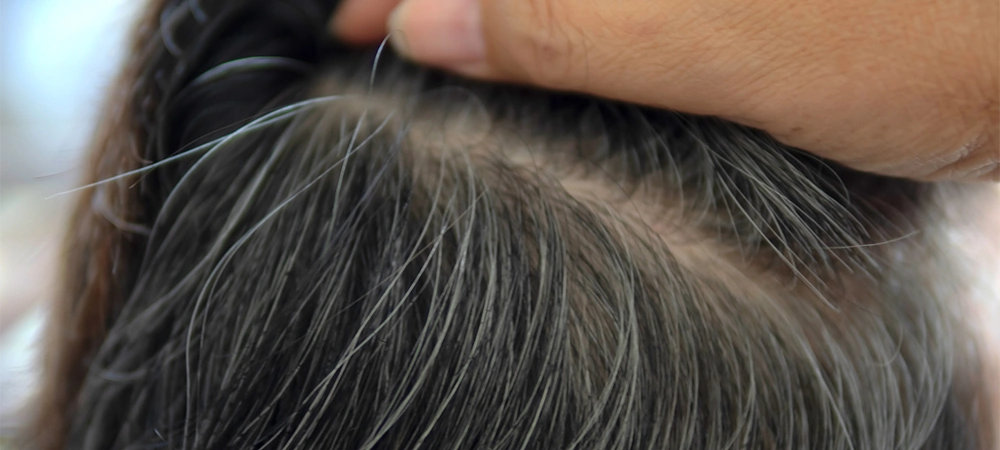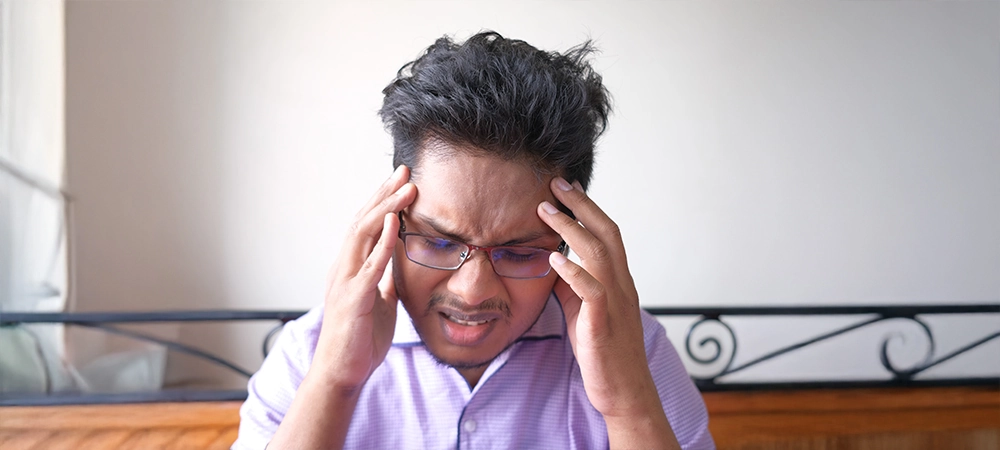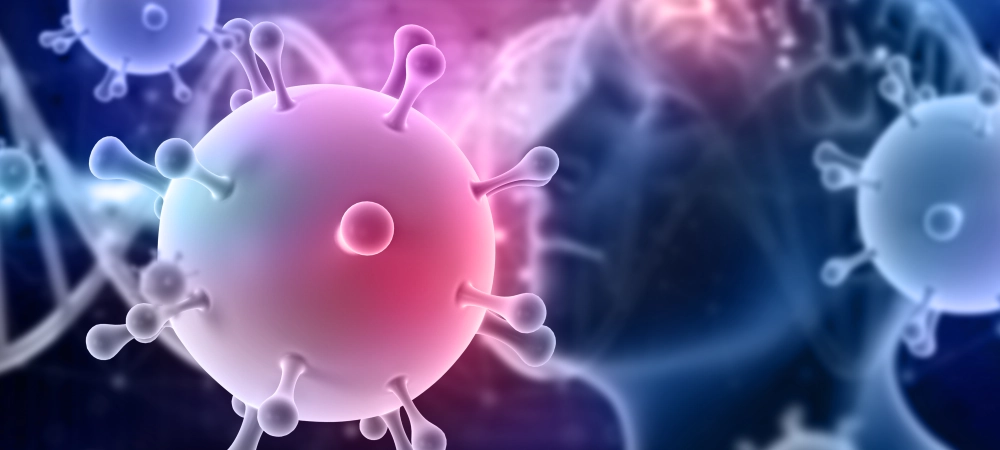
Generally, white hair first appears in our 30s or 40s and that seems normal. But what if those white strands start appearing in your 20s? It can feel like a surprise at first glance to get older and aging, leaving you wondering “Why Me?” Well, the good news is – you are not alone! There are many people out there who are facing white hair problems at a young age and it has nothing to do with aging. The reason for early white hair is quite more complex than we think. Here in this blog, we will understand 5 key reasons for the white hair problem at a young age.
How Does Our Hair Get Its Color?
Before we move further into why white hair comes in young age, it is important to understand how our hair gets its color. The color of our hair is derived from a group of specialized cells known as melanocytes located within the hair follicles. These cells contain melanin which is responsible for giving color to our skin and eyes. When we grow older, it is natural that the level of melanocyte activity diminishes, resulting in reduced pigment production. When this melanin production decreases, the hair loses its color and appears gray and finally, white. For some people, this doesn’t start happening until their 40s. But when it occurs earlier than that, in their 20s, it indicates that some concerns need to be addressed.
Now, let’s have a look at those five factors that lead to premature aging and grey hair.
- Genetics
 Genetics or hereditary is the major reason behind white hair problems in the early 20s. If your grandparents or parents have had issues with whitening hair at an early stage, you are also very likely to have the same problem.
Genetics or hereditary is the major reason behind white hair problems in the early 20s. If your grandparents or parents have had issues with whitening hair at an early stage, you are also very likely to have the same problem.
Though the genes directly responsible for this condition have not been fully identified, studies suggest that several genes contribute towards determining the activities and the life span of melanocytes. These genes will determine the rate at which the pigment producing cells slow down their activities and how susceptible these cells are to damage. The activity of some genes that produce melanin gets reduced in some people from a very young age. As a consequence, hair follicles fail to produce enough melanin, leading to white at a very early age.
It is sad but true that genetics cannot be modified. Hereditary whitening of hair is a fact that one can do nothing about. The only feasible and practical approach is accepting the fact and working towards hair health overall.
- Nutritional Deficiencies
 What you eat greatly determines your overall health including your hair color. Inadequate amounts of certain nutrients and Vitamins can negatively affect the condition of the melanocytes which may lead to early graying of the hair.
What you eat greatly determines your overall health including your hair color. Inadequate amounts of certain nutrients and Vitamins can negatively affect the condition of the melanocytes which may lead to early graying of the hair.
Let’s look at some of the major essential vitamins that can be beneficial for your hair:
- Vitamin B12: This is required to produce red blood cells and to ensure proper cell functioning. Its deficiency is harmful to the functioning of the melanocytes.
- Iron: Iron deficiency reduces the delivery of oxygen and nutrients to the follicles of the hair which reduces the activity of the melanocytes thus leading to white hair.
- Copper: This mineral is needed for the production of melanin in the hair and hair structures. Decreased amounts of copper can increase the rate of pigment loss.
- Vitamin D: Insufficient amounts of vitamin D have been associated with significant hair loss and less production of pigments.
- Folate (Vitamin B9): Folate assists in cell growth and reproduction including melanocytes cells. Its deficiency results in reduced function of the melanocytes.
- Zinc: Deficiency of Zinc leads to problems in the hair as well as lack of pigment. Zinc is vital for cells and many enzymatic processes that enhance the melanin pigments.
If your diet lacks these essential nutrients, your melanocytes may not function optimally, leading to premature graying. Therefore, a well-balanced diet, rich in fruits, vegetables, and lean protein, is essential for maintaining healthy hair. If you suspect a deficiency, consult a doctor who can assess your needs and suggest appropriate supplementation. They may suggest a blood test to identify shortages.
- Chronic Stress
 Stress is not just a feeling, it is also a biological mechanism capable of deeply affecting your body, including hair. Although there is no conclusive evidence that links stress and white hair together, there is enough research that attempts to establish this link.
Stress is not just a feeling, it is also a biological mechanism capable of deeply affecting your body, including hair. Although there is no conclusive evidence that links stress and white hair together, there is enough research that attempts to establish this link.
Cortisol and other similar hormones are released whenever you experience stress. If you go through stress for a long time, this can imbalance hormones which may hinder the functioning of melanocytes and reduce melanin production. Some studies suggest that stress increases the production of free radicals, which can be harmful to the cells responsible for hair pigmentation.
Personal issues, work problems, emotional distress, etc. can lead to a stressful lifestyle which can increase the chances of white hair at an early age. Every stage of life comes with its own set of stress and the reasons people experience stress are different, however, research has shown people are more likely to experience hair loss and graying hair due to stress.
Managing stress is crucial for overall well-being, and it can also help protect your hair color. This involves finding healthy coping mechanisms, such as exercise, meditation, yoga, spending time in nature, or pursuing hobbies you enjoy. If you find yourself constantly overwhelmed by stress, exploring therapeutic options or stress management techniques with a mental health professional can be beneficial.
- Autoimmune Disorders
 In some cases, white hair at a young age can be attributed to autoimmune conditions, where your immune system mistakenly attacks healthy cells, thus, impacting pigment-producing cells in hair follicles. Autoimmune disorders such as vitiligo or thyroid conditions can directly target and destroy melanocytes, leading to disruption in the production of melanin.
In some cases, white hair at a young age can be attributed to autoimmune conditions, where your immune system mistakenly attacks healthy cells, thus, impacting pigment-producing cells in hair follicles. Autoimmune disorders such as vitiligo or thyroid conditions can directly target and destroy melanocytes, leading to disruption in the production of melanin.
- Vitiligo: Characterized by loss of pigment in skin patches, vitiligo can also affect melanocytes in hair follicles, leading to white hair.
- Thyroid Disorders: Both hyperthyroidism and hypothyroidism can impact hair health and melanocyte function, contributing to premature graying.
- Alopecia Areata: This condition causes hair loss in patches but can also lead to whitening of the hair during the regrowth phase.
- Lifestyle Factors
 Apart from Genetic, nutritional deficiencies, stress, and autoimmune disorders, your daily lifestyle choices also greatly impact your hair health and become a factor in white hair problems.
Apart from Genetic, nutritional deficiencies, stress, and autoimmune disorders, your daily lifestyle choices also greatly impact your hair health and become a factor in white hair problems.
- Smoking: Smoking can cause a variety of health issues, and premature white hair problems are one of them. The toxins in cigarette smoke can damage melanocytes, speed up oxidative stress, and contribute to hair pigment loss.
- Environmental Toxins: Frequent exposure to pollutants, chemicals, and heavy metals can create free radicals in the body, that can damage hair follicles and melanocytes, leading to pigment reduction.
- Improper Hair Care: Excess use of heating tools, harsh chemical treatments, and low-quality hair products can damage hair follicles, harm melanocyte function and lead to pigment loss.
Your unhealthy lifestyle habits increase the problems your hair is already dealing with. They can further speed up the white hair problems, especially if you have a genetic grey hair condition. Therefore, you need to make conscious lifestyle changes to support healthy hair. You should quit smoking, avoid excessive exposure to environmental toxins, use gentle hair care products, and minimize heat styling.
Conclusion
White hair problems in your 20s can be quite distressing. However, it is important to note that there could be multiple reasons for it. Although you can’t do anything about the genetic factors, still you can manage other factors such as nutrition, stress, autoimmune conditions, and lifestyle choices. Further, if you notice that your hair is turning white prematurely, you should consult a dermatologist. They will provide white hair in young age solution aimed at averting white hair issues during your youth.





